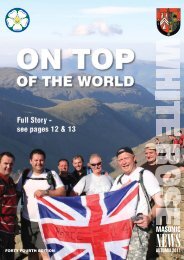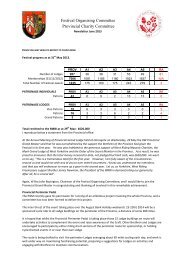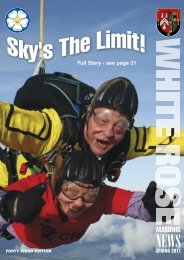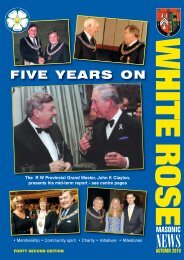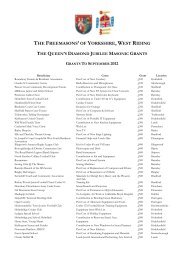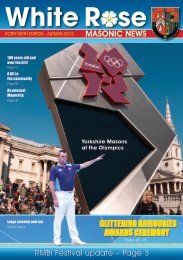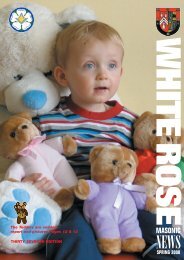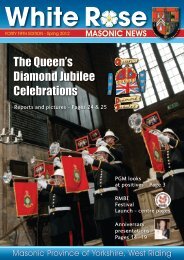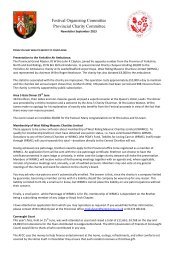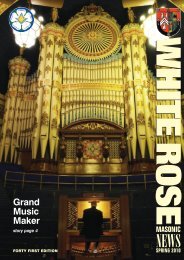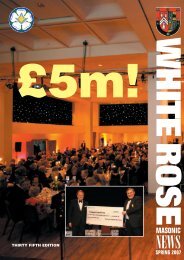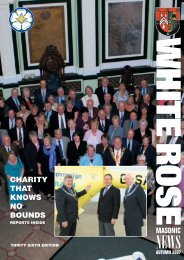White Rose - Masonic Province of Yorkshire, West Riding
White Rose - Masonic Province of Yorkshire, West Riding
White Rose - Masonic Province of Yorkshire, West Riding
You also want an ePaper? Increase the reach of your titles
YUMPU automatically turns print PDFs into web optimized ePapers that Google loves.
FOUNDERS’ JEWELS<br />
The heritage <strong>of</strong> a <strong>Masonic</strong> Lodge’s origin<br />
is an important part <strong>of</strong> the character <strong>of</strong> most,<br />
if not all, Lodges and Founder’s jewels are<br />
an essential ingredient <strong>of</strong> that heritage.<br />
They authenticate the very beginning <strong>of</strong> the<br />
Lodge’s formation.<br />
Stage two <strong>of</strong> the Historical Records<br />
survey carried out in the <strong>Province</strong> <strong>of</strong><br />
<strong>Yorkshire</strong> <strong>West</strong> <strong>Riding</strong> in 2011 – 12 required<br />
all Lodges to document, amongst other<br />
items, <strong>Masonic</strong> jewels in their possession.<br />
This part <strong>of</strong> the survey completed by the<br />
Vale <strong>of</strong> Nidd Lodge No 4984 revealed<br />
amongst its miscellaneous collection<br />
<strong>of</strong> jewels a Founding Junior Warden’s<br />
jewel from Leyton Grange Park Lodge No<br />
5473. This Lodge, originally based in East<br />
London, was consecrated on 6 November<br />
1934 in a ceremony at Freemasons Hall,<br />
London. The Lodge now meets at the MH,<br />
Chingford in the <strong>Province</strong> <strong>of</strong> Essex. Despite<br />
fairly extensive research by the Vale <strong>of</strong> Nidd<br />
Lodge secretary, it proved impossible to<br />
establish any connection to Leyton Grange<br />
Park Lodge and explain how this particular<br />
jewel came to be in a display cabinet in<br />
Pateley Bridge.<br />
However, the Vale <strong>of</strong> Nidd Brethren<br />
determined to return the jewel to its rightful<br />
home in Essex. ‘Accordingly, a stated day<br />
having been appointed for its return to<br />
Chingford’, the Vale <strong>of</strong> Nidd Master, W Bro<br />
Jim Millington, accompanied by three other<br />
Lodge Brethren, journeyed to Essex in<br />
October 2012 to attend a meeting <strong>of</strong> Leyton<br />
Grange Park Lodge and formally return their<br />
Founding Junior Warden’s jewel, this being<br />
one <strong>of</strong> only three now in their possession.<br />
A second Founder’s jewel, this time from a<br />
Lodge in the Scottish Constitution, was also<br />
discovered during the Historical Records<br />
survey and arrangements are currently<br />
being made to return it to its original Lodge.<br />
The Vale <strong>of</strong> Nidd Lodge, consecrated<br />
on 14 February 1928, had 21 Founder<br />
members. Over the intervening years<br />
knowledge <strong>of</strong> the whereabouts <strong>of</strong> many<br />
<strong>of</strong> its Founder’s jewels has been lost. The<br />
Lodge has only seven <strong>of</strong> the twenty one<br />
in its possession and would welcome any<br />
information which could lead to the return <strong>of</strong><br />
the other 14.<br />
The picture shows the WM <strong>of</strong> the Vale <strong>of</strong><br />
Nidd Lodge, W Bro Jim Millington (centre<br />
right) having presented the Founder’s jewel<br />
to the WM <strong>of</strong> Leyton Grange Park Lodge.<br />
THINGS<br />
AREN’T<br />
WHAT THEY<br />
USED TO BE<br />
W Bro David Battye <strong>of</strong> Hillsborough<br />
Lodge No 5444 reflects on the<br />
differences faced by many working<br />
Masons over the years<br />
When my Lodge, Hillsborough No 5444,<br />
was consecrated in 1933, it was a very<br />
different world in a variety <strong>of</strong> ways. Car<br />
ownership was a rarity, people usually<br />
worked within easy travelling distance <strong>of</strong><br />
home and communication was by post<br />
as most people did not own a telephone.<br />
Travel to distant countries was by<br />
steamship and took days or weeks rather<br />
than hours. Many areas <strong>of</strong> employment<br />
in which members were engaged had a<br />
reasonably relaxed approach to requests<br />
for an occasional early departure.<br />
All these differences have played a part<br />
in how members can and do attend and<br />
interact with their Lodges.<br />
In 1933 one could imagine a late arrival<br />
at my Lodge in Sheffi eld placing the blame<br />
on the tram journey from a local factory or<br />
<strong>of</strong>fi ce. This would almost certainly be within<br />
about ten miles, at the most, for almost<br />
all members. The majority would be well<br />
within this distance. Absences because <strong>of</strong><br />
work were probably limited to late working,<br />
for a variety <strong>of</strong> reasons. Attendances were<br />
generally high, as a percentage <strong>of</strong> the<br />
Lodge members.<br />
When I was initiated in 1968, matters<br />
had changed, but the general effect on the<br />
Lodge and on attendances had not been<br />
greatly affected. Then, we were getting<br />
the blame for late arrival placed on traffi c<br />
density. Absence because <strong>of</strong> work was<br />
limited to those few who were working a<br />
greater distance from the Lodge, say over<br />
50 miles or so, and most <strong>of</strong> those were not<br />
permanently employed so far away.<br />
After the time I had passed through the<br />
chair, in 1981, matters were beginning to<br />
change at an accelerating pace. I frequently<br />
found myself working at locations far<br />
away from Sheffi eld, almost anywhere<br />
between Londonderry and Lowest<strong>of</strong>t, or<br />
between Perth and Penzance. Most <strong>of</strong><br />
these occasions involved work during the<br />
evening. The chances <strong>of</strong> returning to Lodge<br />
for a meeting were non-existent. This was<br />
exacerbated by conferences abroad,<br />
which were not scheduled to suit me and<br />
the exigencies <strong>of</strong> Lodge attendance.<br />
Even when I did manage to attend, there<br />
were occasions when I had to blame trains,<br />
motorway incidents or fl ight problems<br />
as the cause for lateness. Attendance<br />
percentages fell, not because <strong>of</strong> lack <strong>of</strong><br />
or dwindling interest, but because <strong>of</strong> work<br />
pressures. A work-style change reduced<br />
these pressures markedly, but only<br />
retirement has restored the luxury <strong>of</strong> being<br />
in control <strong>of</strong> time and place so that Lodge<br />
can again take a more suitable place in my<br />
priorities.<br />
All these and more problems are being<br />
faced by Brethren in my own and in most<br />
other Lodges. The problem is not reducing<br />
but increasing at a seemingly everincreasing<br />
pace.<br />
In the light <strong>of</strong> all the above, we must<br />
fi nd a way <strong>of</strong> working fl exibly in our<br />
Lodges, taking a more relaxed attitude<br />
to those, mainly younger, Brethren who<br />
are pressured by their work to be at<br />
another place on many occasions. Are we<br />
understanding <strong>of</strong> their problems? Most<br />
<strong>of</strong> the burden <strong>of</strong> covering for absence will<br />
rest on the Past Masters. Do they exhibit<br />
sympathy or do they show irritation and<br />
make remarks which may drive members<br />
away? Are we prepared to accept a less<br />
than 100% attendance in a candidate<br />
for Master so that he can progress and<br />
eventually, when work simmers down, play<br />
his rightful part among the rulers <strong>of</strong> the<br />
Lodge and among the senior members <strong>of</strong><br />
the Craft?<br />
Have we the graciousness to recognise<br />
that times have changed, probably<br />
permanently, and members now work<br />
frequently anywhere in Europe, or indeed<br />
further away, but that the commitment to<br />
Lodge and the Craft has not diminished<br />
necessarily? Unless we can answer<br />
positively to these points, then we will<br />
lose many <strong>of</strong> the most promising <strong>of</strong> our<br />
members and the Craft and our own<br />
Lodges will be the losers.<br />
St WILFRID LODGE No 6395 IS PROUD TO SUPPORT THIS PAGE OF THE WHITE ROSE MASONIC NEWS<br />
Meeting on the 2nd Thursday <strong>of</strong> each month except Aug at Castle Grove <strong>Masonic</strong> Hall, Headingley, Leeds. LS6 4BP<br />
<strong>White</strong> <strong>Rose</strong> <strong>Masonic</strong> News Spring 2013<br />
9



